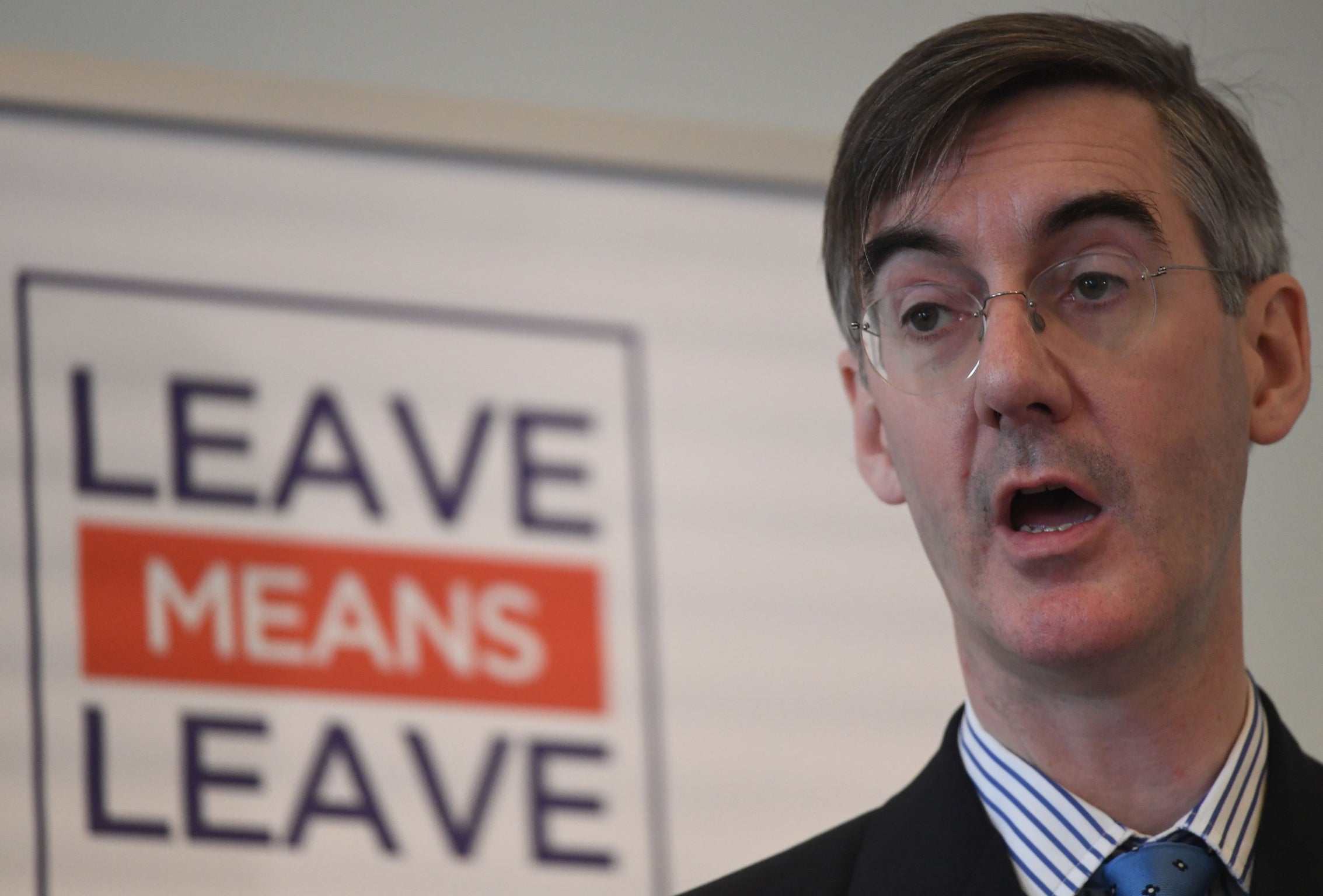Theresa May risks being replaced and splitting Tory party if she ignores Eurosceptics' demands, says Jacob-Rees Mogg
Leading Brexiteer warns prime minister not to take same approach as Sir Robert Peel, who was ousted as leader and caused Tory divide

Jacob Rees-Mogg has warned Theresa May she risks splitting the Conservative Party in two and could be ousted as prime minister if she breaks Tory backbench Eurosceptics’ red lines on Brexit.
The arch Brexiteer compared Ms May’s predicament to that of 19th Century prime minister Sir Robert Peel, who forced through the controversial repeal of the Corn Laws against the wishes of many of his MPs.
The move resulted in Peel being forced to quit as prime minister and the Conservative Party splitting, with the “Peelites” eventually joining forces with the Whigs and others to form the Liberal Party.
Asked about Brexiteers' demands after delivering a speech to mark one year until Brexit, Mr Rees-Mogg said Ms May would be risking similar consequences if she relies on Labour votes to get a final Brexit agreement through parliament without the support of her Eurosceptic backbenchers.
He said: “Let’s be frank: all the red lines have gone in the transition deal – there isn’t a red line left in that.
“The concern is whether the red lines will be in the final withdrawal agreement."
In a thinly-veiled threat, he added: “I’m sure the prime minister knows her history. I’m sure that she knows how Robert Peel got the repeal of the Corn Laws through. No Conservative leader would ever wish to get through so major a piece of legislation again on the back of opposition votes.
“I think the Government will stick to its red lines, because that is the political reality.”
The Government has backed down on a number of issues in order to secure a transition agreement with Brussels, including agreeing that the UK will fall under the jurisdiction the European Court of Justice for a further two years, and giving EU countries access to British fishing waters until 2021. The transition deal also states that the UK will continue to follow EU regulations unless a separate agreement is reached in relation to the Northern Ireland border.
Brexiteers have said they could vote against the final deal if that agreement includes similar arrangements.
In a speech organised by the Leave Means Leave group, Mr Rees-Mogg called opponents of Brexit “cave dwellers” and compared them to Hiroo Onada – the WW2 Japanese soldier who only surrendered in 1974, having refused to believe the war was over.
Mr Rees-Mogg, who chairs the European Research Group of Eurosceptic Tory backbenchers, said: “It has taken us some time to rediscover the opportunities of a truly global Britain and a few cave dwellers still want to stop the process, but with 367 days to go the United Kingdom will be free.”
He also claimed Theresa May’s response to the Salisbury nerve agent attack was bolder than it would have been because of Brexit.
He said: “It is striking that the Prime Minister’s robust response to Russia has occurred as we are leaving the European Union. Even the prospect of freedom has made us bolder and more forthright in the defence of our national interest. At the same time, our allies rallied to our cause because they respect strength rather than weakness.”
Mr Rees-Mogg added: “There is a world of opportunity ahead of us. Economically, leaving the European Union by getting rid of unfair, anti-competitive tariffs and by controlling our borders will help the least well off in society the most. Constitutionally, we will be in charge of our own destiny protected by our own laws and with no more excuses for our politicians. In international affairs, we will be setting our own direction, not hiding behind the skirts of the German Chancellor.
“If we do not believe that we can do better by our own efforts, our own endeavours and our own choices, then we have become the managers of decline. Suez was forced upon us because of our precarious financial state after the war and the dishonesty of those who pursued the policy. The national humiliation was brought upon ourselves.
“This time it would be worse. We would be admitting as a nation that we simply did not cut the mustard, we were not up to taking our place in the world, and we were so fearful, fretful of the future, that we had to allow somebody else to do it for us. It would be an unutterable failure of political will by the Establishment when the British people have shown the courage to take their destiny in their own hands.”
Subscribe to Independent Premium to bookmark this article
Want to bookmark your favourite articles and stories to read or reference later? Start your Independent Premium subscription today.

Join our commenting forum
Join thought-provoking conversations, follow other Independent readers and see their replies